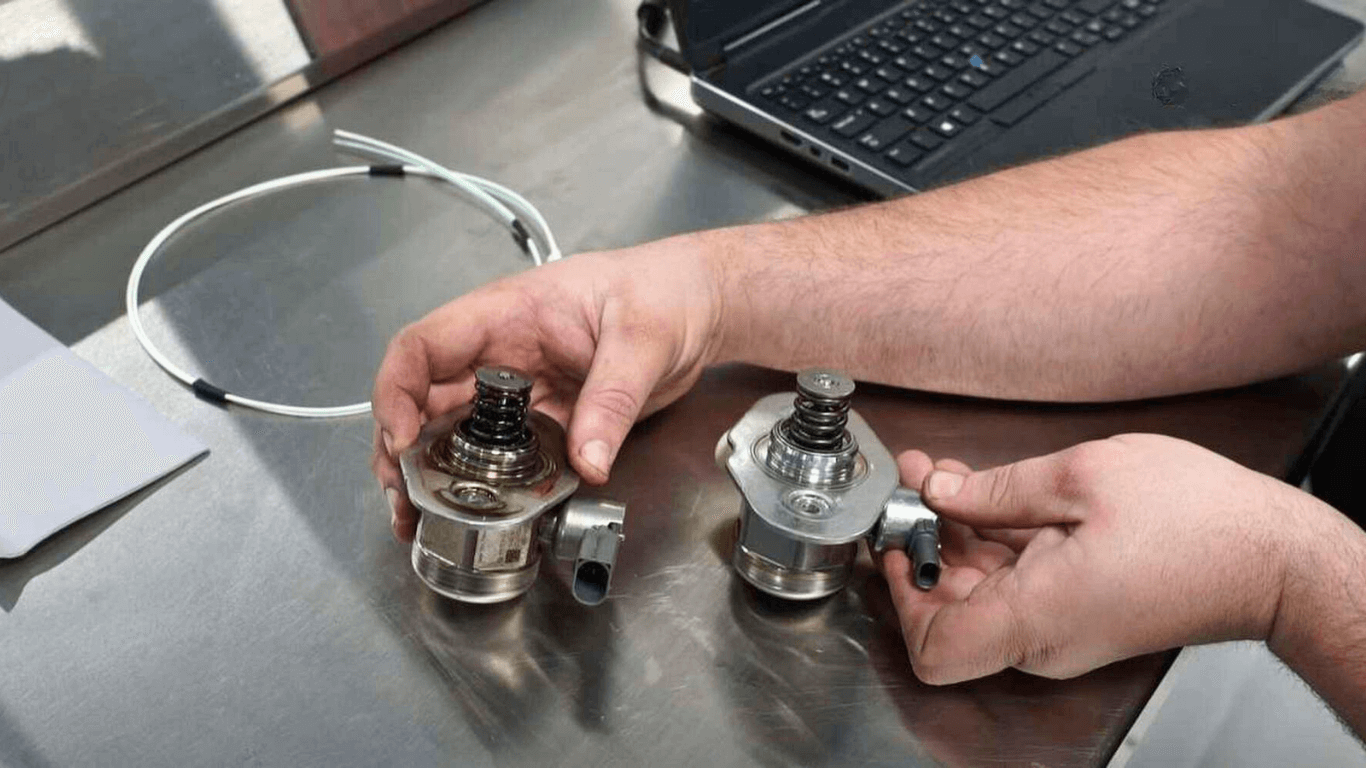Average BMW Fuel Pump Replacement Cost, Labor & Parts Guide
Are you having issues starting your BMW or stalling out while driving? There’s a good chance your fuel pump needs to be replaced. But how much will this repair cost you?
In this detailed guide, we’ll cover everything you need to know about BMW fuel pump replacement cost including:
The average total cost is $500 – $1,200 depending on the model. Labor will be 2 – 5 hours and parts around $200 – $600+.
Below we’ll break down the specifics on cost by model, what causes pumps to fail, DIY feasibility, and ways to save money on this repair.
What Does a Fuel Pump Do in a BMW?
Before jumping into costs, let’s quickly overview what the fuel pump does and why it’s an important component in your BMW’s fuel system.
The fuel pump is responsible for delivering gasoline from your fuel tank to the engine at the required pressure and flow rate. It’s an electric pump located inside the fuel tank and is submerged in gas.
Some key functions and features:
- Provides constant fuel pressure to the fuel injection system
- Designed for long life but will eventually fail over 100K+ miles -Activated by the ignition system when engine is cranked or running
- If it fails, engine will not start or will stall during driving
So in summary, the fuel pump is the heart of your BMW’s fuel delivery system. When it stops working, so does your car.
What Causes a Fuel Pump to Fail in a BMW?
BMW fuel pumps are robustly designed but they will eventually fail with age and mileage. Here are some of the most common causes of fuel pump problems:
- Wear and tear – The pump has an electric motor that spins at thousands of RPMs. After 100K+ miles, internal bearings and components wear out.
- Debris – Small amounts of dirt or debris over time can clog up the fuel pump inlet and impeller causing reduced flow or pressure.
- Electrical failure – Electrical shorts in the wiring or inside the pump motor windings will lead to pump failure.
- Fuel contamination – Bad gas with debris or water can contaminate the pump and fuel lines.
- Impact damage – A hard jolt from a pothole or accident may damage the in-tank pump.
As you can see, there are quite a few ways these hard working pumps eventually fail. Diagnosing the root cause of fuel pump issues can be tricky, which is why it’s best left to an experienced BMW mechanic.
How Much Does it Cost to Replace a Fuel Pump in a BMW?
Okay, let’s get into the nitty gritty on fuel pump replacement costs for various BMW models.
Repair costs are made up of:
- Parts – The pump itself and any gaskets/hardware
- Labor – The time it takes the mechanic to complete the job
On average, expect to pay $500 – $1,200 or more for BMW fuel pump replacement. Prices vary quite a bit by model, pump type, and your location.
Here’s a breakdown of typical costs by BMW series:
- 328i – $600 – $900
- 335i – $700 – $1,000
- M3 – $900 – $1,400
- M5 – $1,000 – $1,600
- X5 – $800 – $1,200
As you can see, the high performance M models are the most expensive while the base 3-Series is the most affordable.
In addition to the pump itself, labor rates average $100/hr for BMW mechanics. The job can take 2 hours on a 328i up to 5+ hours on an M5. We’ll dig into why later on.
Some key factors that affect total fuel pump replacement cost include:
- Model – More expensive cars have higher labor rates
- Location – Big cities have higher shop rates
- Problem diagnosis – If causing other issues, more $$$
- Gas tank drainage – Adds 1-2 hours of labor
The good news is that a failed fuel pump won’t damage other parts of the fuel system. So unlike an engine or transmission problem, you’re just paying for the pump replacement itself.
But it’s still a sizable and unavoidable repair when your fuel pump goes bad. Next let’s look at the specific steps involved in replacing it.
What Does the Fuel Pump Replacement Procedure Involve?
Replacing a fuel pump in a BMW is fairly straightforward mechanically, but labor intensive due to its location inside the fuel tank.
Here is an overview of the step-by-step procedure:
- Drain any fuel from the tank
- Disconnect the negative battery cable
- Remove rear seat cushion for access
- Open cover to reveal pump and level sender
- Disconnect electrical harness and fuel lines
- Remove lock ring and pull out old pump
- Install new pump with gasket and lock ring
- Reconnect electrical and fuel lines
- Reinstall rear seat and interior trim
- Refill gas tank and check for leaks
- Prime the system and test start the car
As you can see, the mechanic has to remove interior trim pieces just to gain access to the in-tank pump. Combined with the tedious nature of working inside the dark, cramped fuel tank, it adds up to hours of labor.
On some BMW models like the 7-Series, the entire back seat may need to be removed making the job even more complex. The fuel tank does not need to be fully dropped in most cases.
Working inside a fuel tank also requires safety precautions and fuel soak up materials in case of spills. Your mechanic will also need to properly prime and bleed the fuel system to get all the air out after the pump is replaced.
So in summary, fuel pump replacement requires patience, finesse, and the right tools and skills to complete successfully. Now let’s look at how long the typical repair takes.
How Long Does BMW Fuel Pump Replacement Take?
The estimated labor time to replace a BMW fuel pump is 2 – 5 hours or longer in some cases. Here are some averages by model:
- 328i – Around 2 hours
- 535i – 3-4 hours
- M3 – 4 hours
- M5 – 4-5+ hours
The experience of the mechanic is also a major factor in how long the job takes. A BMW specialist can likely complete the job quicker than a general repair shop.
Some additional factors that can add hours to the repair time include:
- Draining all fuel from tank – Adds 1-2 hours
- Difficult access on certain models
- Diagnosing other issues – fuel pressure, leaks, etc
- Waiting for parts – may take a day or two
As you can see, for many BMW owners this will end up being an all-day repair job. The good news is you can still drive the car carefully if the pump is starting to fail, unlike an urgent engine repair for example.
But ultimately the fuel pump must be replaced in order to restore full performance and prevent the car from stalling.
Can I Replace a BMW Fuel Pump Myself?
Is fuel pump replacement something you can DIY on your BMW, or best left to the professionals? Let’s take a look.
Mechanically speaking, replacing the pump itself is straightforward. But there are some important factors to keep in mind:
- Fuel spills inside the tank are highly hazardous
- Proper fuel system bleeding is critical
- Many special tools needed for access
- Advanced electrical troubleshooting may be required
While experienced home mechanics can technically replace a fuel pump in a BMW, it requires:
- Shop experience working fuel systems
- The ability to follow technical procedures
- A fuel pressure tester and scan tool
- Torque wrenches and fuel line tools
- Proper jacks and jack stands
Without the skills, tools, and space to safely take on this repair, it is highly recommended to have a professional BMW mechanic replace your fuel pump.
The risk of a DIY fuel pump job going sideways and costing more in damages is quite high. Pay the extra labor for peace of mind.
How Can I Save Money on BMW Fuel Pump Replacement?
Okay, here are some smart tips to save money when you need to replace your BMW fuel pump:
- Shop around – Get quotes from 3-4 shops to compare pricing and service packages. Avoid dealerships as they tend to be most expensive.
- Ask about the warranty – Many shops provide a 6 month to 1 year warranty on parts and labor. This protects you from defects or premature failure.
- Use quality aftermarket parts – Genuine BMW pumps are very pricey. Quality aftermarket pumps made by Bosch and Airtex work just as well for less cost.
- Buy your own parts – You can save 10-20% on parts cost by purchasing them online and supplying them to the shop doing labor only. Confirm the part # with them first.
- Negotiate on labor – If the quote seems high, respectfully ask if they can take a little off labor hours. Offer to provide a positive review. Most shops want happy customers.
Following these tips and finding an experienced independent BMW specialist for the job can potentially save you hundreds of dollars.
Conclusion: Plan Ahead to Reduce BMW Fuel Pump Replacement Costs
In summary, the average total cost to replace a fuel pump in a BMW ranges from $500 into the $1000s depending on model and your location.
Labor makes up a significant portion due to the tedious process of accessing the in-tank pump. Parts are also expensive from BMW, but affordable quality aftermarket alternatives exist.
While a failing fuel pump cannot be prevented indefinitely, you can minimize costs by:
- Finding an independent shop that specializes in BMWs
- Providing your own quality parts
- Asking for warranty protection on the new pump
With some planning and research, you can reduce the hit to your wallet that this critical fuel system repair entails.
Does your BMW need a new fuel pump based on the symptoms? Get a quick diagnosis before making any repairs. Our BMW-experienced mechanics are ready to inspect your fuel system. Contact us today to schedule an appointment.







